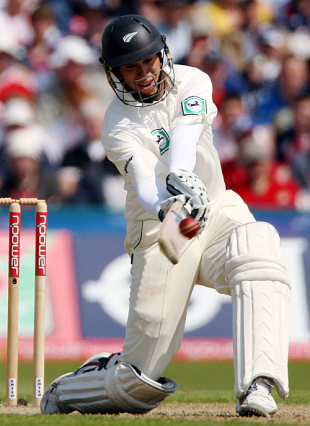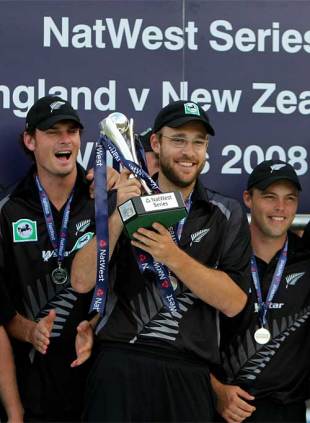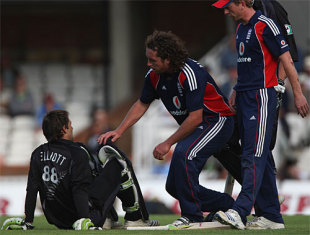England v New Zealand 2008
Stephen Brenkley
Test matches (3): England 2, New Zealand 0
One-day internationals (5): England 1, New Zealand 3
Twenty20 international (1): England 1, New Zealand 0

|
|||
|
Related Links
Players/Officials:
James Anderson
| Paul Collingwood
| Kyle Mills
| Owais Shah
| Ryan Sidebottom
| Tim Southee
| Andrew Strauss
| Ross Taylor
| Michael Vaughan
| Daniel Vettori
Series/Tournaments:
New Zealand tour of England and Scotland
Teams:
England
| New Zealand
|
|||
By the time the New Zealanders departed, it was clear that they were afflicted by cricket's version of a split personality. On the one hand were the naive, uncertain and occasionally clueless players who were defeated 2-0 in peremptory fashion in the Test series. On the other were the streetwise, calculating and smart cricketers, frequently the same individuals, who imposed a burgeoning authority on a controversial one-day series in which they deservedly beat England 3-1. In between, they lost the solitary Twenty20 international by a country mile, suggesting a three-way split.
The teams did not invariably enjoy cordial relations. This was probably caused partly by spending too much time in each other's company: by close of play in the last one-day international, they had met in 19 matches over five months. Staging home and away series back to back was not good scheduling.
There was also an undoubted perception that England played with too much of a swagger in their step. During the Oval one-day game it led to an unsavoury incident when Grant Elliott was run out while slumped on the ground after colliding with the bowler, Ryan Sidebottom. Briefly, it seemed as though the cricketing friendship between England and New Zealand would be damaged as never before. It did not happen, but there was an overriding sense of relief when the end came. Familiarity had bred contempt.
The likelihood was always that New Zealand would be better equipped for the shorter game. It is the basket in which they have placed almost their entire egg supply for at least a decade. In some ways, they have paid mere lip service to Tests, and their lack of experience, depth and guile was exposed. Long before the end of the rubber, it was possible, indeed necessary, to fear for the future of New Zealand's Test cricket. They do not play nearly enough to learn the tricks of the trade, principally the discipline of batting all day or "batting time"; and, although they have an admirable youth coaching structure, their domestic first-class competition borders on the anaemic.
John Bracewell, the senior squad's coach, stressed his desire to play more Tests. But to do that effectively New Zealand needed greater depth. Bracewell would not be around to change things; his departure was an open secret at the start of the tour, and his return to Gloucestershire for 2009 was confirmed in July. He himself never quite allayed the suspicion that, like his side, he was a one-day specialist.
The Test failings were compounded by the retirement of key players. The long-serving erstwhile captain Stephen Fleming, now 35, had chosen to play in the inaugural Indian Premier League instead. Scott Styris had gone the same way, giving up Test cricket though not one-day internationals. A calm innings from either of those two on the third day at Old Trafford would surely have given New Zealand a share of the series. Just as damaging, their best and fastest bowler, Shane Bond, had been banned by New Zealand Cricket in a clumsy piece of administrative autocracy. He had been recruited by the Indian Cricket League, the rival to the official IPL, and the Board of Control for Cricket in India then insisted that the boards of other nations should take a hard line against ICL players. NZC acquiesced, even though they had initially given Bond permission; when he declined to break his contract, his international career - already blighted by recurrent injury - was all but terminated. That fatally weakened New Zealand's chances.

|
|||
There were occasions when they competed ferociously. Though they were perhaps slightly fortunate to escape from Lord's with a draw, when more than 160 overs were lost to rain and bad light, the eleven defeated at Old Trafford after fashioning a winning position may recall it with alarm for the rest of their lives. It effectively did for them; England, themselves so fallible and short of gumption in many areas, exploited their advantage to inflict a crushing defeat in the final Test at Trent Bridge. That New Zealand responded so vigorously in the one-day series said much about their captain, their character, their confidence in what they were doing, and their priorities - in which they might feel they had little choice.
The start of the tour epitomised the grim truth that there are haves and have-nots in world cricket and that New Zealand, because of their small population, their geographical isolation and the fact that rugby rules all, are firmly in the have-not category. Five of their players, including the captain Daniel Vettori, arrived a week late because NZC had given them permission to play in the opening rounds of the IPL.
Vettori and the other four - Brendon McCullum, Jacob Oram, Kyle Mills and Ross Taylor - earned money in the glittering new Twenty20 competition that NZC could not hope to match. McCullum's three-year contract was worth a potential $US700,000 in the first year, subject to playing all 14 of the Kolkata Knight Riders' matches; although he had time for only four before leaving for England, the proportion to which that left him entitled still meant a considerable amount.
If it was odd for a third of the squad to miss the tour's first two matches because they were fulfilling other duties, it was a necessary compromise, regardless of the effect it might have on the rest of the dressing-room. NZC embraced the needs and concerns of their star players - except Bond, whose expulsion left the attack decidedly short of venom and depth. Both Chris Martin and Mills would have been more effective for Bond's presence, and New Zealand must be careful to nurture the promising teenage fast bowler, Tim Southee, who played in the opening Test. Their batting gave still greater cause for concern, especially the top order, which had a threadbare look: the specialist batsmen had hit a single Test century between them, while McCullum's two were against Bangladesh and Zimbabwe. All the fears were well-founded. Only once in six Test innings did they reach three figures before losing their third wicket.
Ill-equipped the tourists may have been, but it was quickly discernible that England too had plenty of fragile components. At Lord's, the home side were unchanged for the third match running after winning the final two Tests in New Zealand two months earlier, a sequence they would eventually take to a world record six. But this continuity stemmed as much from the lack of challenging alternatives as the team's inherent quality.
Nobody was under closer scrutiny than England's captain, Michael Vaughan, in the final months of his reign. If Vettori had had a hard act to follow in Fleming, from whom he had taken over as captain in September, the days of wine and roses were beginning to appear part of Vaughan's past. His leadership skills remained unquestioned (for the moment), but he desperately needed runs to quash growing doubts about his batting. He responded with a century at Lord's, though England were thwarted by the weather. Thanks largely to McCullum, who became the only man to have made two Test scores in the nineties at Lord's without also reaching at least one hundred, New Zealand scored just enough first-innings runs to stay competitive. Bad light cursed proceedings throughout and instigated equally murky discussions on most days about whether players should or should not stay on and umpires be more flexible. It was tiresome and frustrating for all concerned, and New Zealand easily secured the draw that must have been the limit of their aspirations.

|
|||
In Manchester, however, the tourists were much the superior team until well into the third day, when suddenly all their frailties came to the fore. A century of the highest calibre from Taylor (only two of his compatriots had scored more than his 154 in a Test innings on English soil) established a strong position, enhanced by England's feeble batting. All New Zealand had to do was make upwards of 200 and they would probably have been unassailable. But, short of a batsman because Daniel Flynn was advised not to bat (a fearful blow from James Anderson had removed two of his teeth), they were dismantled by Monty Panesar, who found the pace of the pitch exactly to his liking. The visitors, hapless against a ball which sometimes turned appreciably and sometimes not at all, imploded. England still needed 294 for victory, but they knew they had been reprieved and the balance had shifted irrevocably. Vettori, threatening in the first innings, was neutered, and a match-winning century by Strauss made his restoration as a Test player seem complete.
So the stuffing was knocked out of New Zealand and, whatever the odds said, they could hardly have been long enough on their levelling the series in Nottingham. While England did precious little to quell the disquiet about their batsmen's inability to operate effectively as a unit or to assert themselves in any meaningful way, their swing bowlers were altogether too much of a handful. The New Zealanders were not up to it, and they had probably had quite enough of not being up to it. Some of those who were up to it might have been a place too high in the batting order. Anderson took the first six first-innings wickets to fall and was so potent that for a while all ten seemed a possibility. It was the redoubtable Sidebottom's turn in the second innings; he took his tally of wickets in the six Tests between the sides during the year to 41 at 18.48 runs each, as England finished with a flourish.
Throughout, Vettori and his men had made no secret of the fact that their main intention was to win the one-day matches. When they succumbed with nary a whimper in the Twenty20 international and in the first of the 50-over games, it seemed the Test series had so deflated them that they were incapable of mounting a serious challenge. Had the effect of having a team so obviously divided into stars and non-stars - IPL and non-IPL - undermined spirit? Were they simply ready for home?
What a resounding answer they provided. First, they had to overcome being denied victory at Edgbaston, where play was abandoned with only one more over needed for a legitimate result. Though the rain made continuation ridiculous, it was England's go-slow tactics that provoked the howls of outrage. New Zealand would doubtless have done likewise had the positions been reversed, but that did not sweeten the sour taste.
The worst for England was still to come. New Zealand pulled it back to 1-1 in Bristol, and the fourth match at The Oval was a close affair. Needing another 26 to win with three wickets left, it could have gone either way. Then Elliott, trying to steal a sharp single, was upended by Sidebottom, the bowler, who barged into him when trying to retrieve the ball.
These things happen in close games. With Elliott sprawling, however, England effected a simple run-out, and while the batsman was still receiving treatment on the ground their captain, Paul Collingwood, refused to withdraw the appeal despite being given the opportunity by umpire Mark Benson. Had New Zealand not managed to sneak home off the last ball by one wicket - courtesy of an overthrow - there might have been deeper repercussions. As it was, the tourists refused to shake hands, and shut their dressing-room door when Collingwood went to offer congratulations. It reflected badly on Collingwood in particular and England in general, and may have been the reaction of a home team who were aware deep down that they were not good enough.
Fortunately, Vettori's mature response, allied to Collingwood's reasonable admission that he might have done things differently, helped to clear the air. But New Zealand were now in the ascendancy - and England were without their captain. Collingwood found himself banned for four one-day internationals, not for anything connected with the Elliott Incident but because England had bowled their overs too slowly. Since it was his second offence in a year, the penalty escalated from a fine to suspension. Thus, Kevin Pietersen led England for the first time in the last international at Lord's. To no avail. New Zealand played much the more intelligent cricket, pacing their innings to perfection and not giving England a squeak.
It was the second time in the year that New Zealand had beaten England 3-1 and, somewhat astonishingly given the respective resources of the two countries, they had now won 34 of the one-day matches between them to England's 29. If Vettori's position as Fleming's successor was cemented, all the gains England had made under Collingwood in the previous year appeared to have been lost. They were sluggish in thought and deed, and still lacked nous or a real idea of how they should go about making decent totals and using the 20 overs of powerplay. Collingwood, none too surprisingly, resigned before England's next one-day series against South Africa.
Before the New Zealanders could go home, they had the formality of two one-day matches in Aberdeen against Ireland and Scotland. The margin of victory against Ireland was 290 runs, the biggest in one-day international history, and the opening partnership of 266 between McCullum and James Marshall was the second-biggest. It was a high note on which to end. But that the end had come probably grieved no one.
Match reports for
Tour Match: Marylebone Cricket Club v New Zealanders at Arundel, Apr 27, 2008
Scorecard
Tour Match: Kent v New Zealanders at Canterbury, Apr 28-30, 2008
Report |
Scorecard
Tour Match: Essex v New Zealanders at Chelmsford, May 2-5, 2008
Report |
Scorecard
Tour Match: England Lions v New Zealanders at Southampton, May 8-11, 2008
Report |
Scorecard
1st Test: England v New Zealand at Lord's, May 15-19, 2008
Report |
Scorecard
2nd Test: England v New Zealand at Manchester, May 23-26, 2008
Report |
Scorecard
Tour Match: Northamptonshire v New Zealanders at Northampton, May 30-Jun 1, 2008
Report |
Scorecard
3rd Test: England v New Zealand at Nottingham, Jun 5-8, 2008
Report |
Scorecard
Tour Match: Worcestershire v New Zealanders at Worcester, Jun 11, 2008
Scorecard
Only T20I: England v New Zealand at Manchester, Jun 13, 2008
Report |
Scorecard
1st ODI: England v New Zealand at Chester-le-Street, Jun 15, 2008
Report |
Scorecard
2nd ODI: England v New Zealand at Birmingham, Jun 18, 2008
Report |
Scorecard
3rd ODI: England v New Zealand at Bristol, Jun 21, 2008
Report |
Scorecard
4th ODI: England v New Zealand at The Oval, Jun 25, 2008
Report |
Scorecard
5th ODI: England v New Zealand at Lord's, Jun 28, 2008
Report |
Scorecard
1st Match: Ireland v New Zealand at Aberdeen, Jul 1, 2008
Scorecard
3rd Match: Scotland v New Zealand at Aberdeen, Jul 3, 2008
Scorecard

